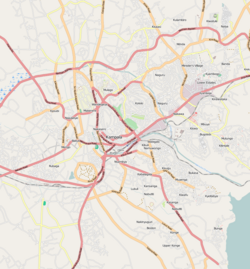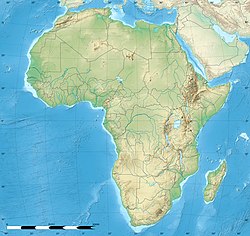Kampala | |
|---|---|
 Counter-clockwise; from top: Panoramic view of central Kampala, Bahá'i Temple, Makerere University, panoramic view of Lake Victoria, Kampala Worker's House, Uganda National Mosque | |
 Kampala highlighted in red inside the Republic of Uganda | |
| Coordinates: 00°18′49″N 32°34′52″E / 0.31361°N 32.58111°E | |
| Country | |
| City | Kampala |
| Government | |
| • Lord Mayor | Erias Lukwago |
| • Executive Director | Dorothy Kisaka[1] |
| Area | |
| • Capital city | 189 km2 (73 sq mi) |
| • Land | 176 km2 (68 sq mi) |
| • Water | 13 km2 (5 sq mi) |
| • Metro | 8,451.9 km2 (3,263.3 sq mi) |
| Elevation | 1,200 m (3,900 ft) |
| Population (2019)[2] | |
| • Capital city | 1,680,600 |
| • Metro | 6,709,900[2] |
| Demonyms | Munakampala |
| Time zone | UTC+03:00 (East Africa Time) |
| • Summer (DST) | (Not Observed) |
| Website | www |
Kampala /kɑːmˌpɑːlɑː-/ (UK: /kæmˈpɑːlə/,[3][4] US: /kɑːmˈ-/)[3][5] is the capital and largest city of Uganda. The city proper has a population of 1,875,834 (2024)[6] and is divided into the five political divisions of Kampala, Kawempe, Makindye, Nakawa, and Rubaga.
Kampala's metropolitan area consists of the city proper and the neighboring Wakiso District, Mukono District, Mpigi District, Buikwe District and Luweero District. It has a rapidly growing population that is estimated at 6,709,900 people in 2019 by the Uganda Bureau of Statistics[7] in an area of 8,451.9 km2 (3,263.3 square miles). Other estimates estimate put the size of the metropolitan area at around four million people.[8]
In 2015, this metropolitan area generated an estimated nominal GDP of $13.80221 billion (constant US dollars of 2011),[9] which was more than half of Uganda's GDP for that year, indicating the importance of Kampala to Uganda's economy.
Kampala is reported to be among the fastest-growing cities in Africa, with an annual population growth rate of 4.03 percent,[10] by City Mayors. Mercer (a New York–based consulting firm) has regularly ranked Kampala as East Africa's best city to live in,[11][12] ahead of Nairobi and Kigali.
- ^ "Profile: Who is Dorothy Kisaka". 14 June 2020.
- ^ a b c d "Table 1.1 : Estimated Land Area and Projected Population by Sex by Lower Local Government" (PDF). Uganda Bureau of Statistics.
- ^ a b "Kampala". Collins English Dictionary. HarperCollins. Retrieved 2 August 2019.
- ^ "Kampala". Lexico UK English Dictionary. Oxford University Press. Archived from the original on 2 August 2020.
- ^ "Kampala". The American Heritage Dictionary of the English Language (5th ed.). HarperCollins. Retrieved 2 August 2019.
- ^ "Kampala (City, Uganda) - Population Statistics, Charts, Map and Location". www.citypopulation.de. Retrieved 16 January 2024.
- ^ Kampala Population 2019[permanent dead link]
- ^ "Kampala, Uganda Metro Area Population 1950-2023". www.macrotrends.net. Retrieved 1 November 2023.
- ^ Wang, Xuantong; Rafa, Mickey; Moyer, Jonathan D.; Li, Jing; Scheer, Jennifer; Sutton, Paul (16 January 2019). "Estimation and Mapping of Sub-National GDP in Uganda Using NPP-VIIRS Imagery". Remote Sensing. 11 (2): 163. Bibcode:2019RemS...11..163W. doi:10.3390/rs11020163.
- ^ "City Mayors: World's fastest-growing urban areas (1)". www.citymayors.com.
- ^ Muhindo, Clare (26 February 2016). "Kampala Ranked Best City In East Africa". New Vision. Archived from the original on 27 August 2019. Retrieved 27 August 2019.
- ^ "Quality of Living City Ranking". mobilityexchange.mercer.com. Retrieved 16 January 2021.


